
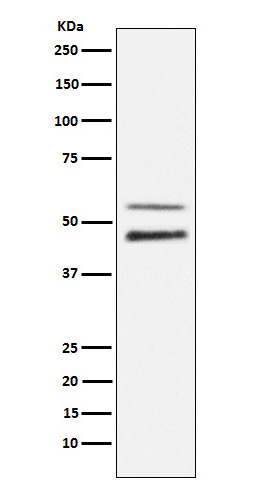
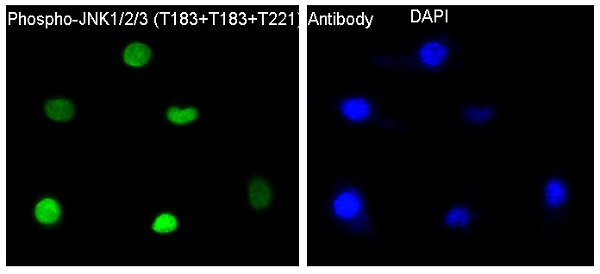
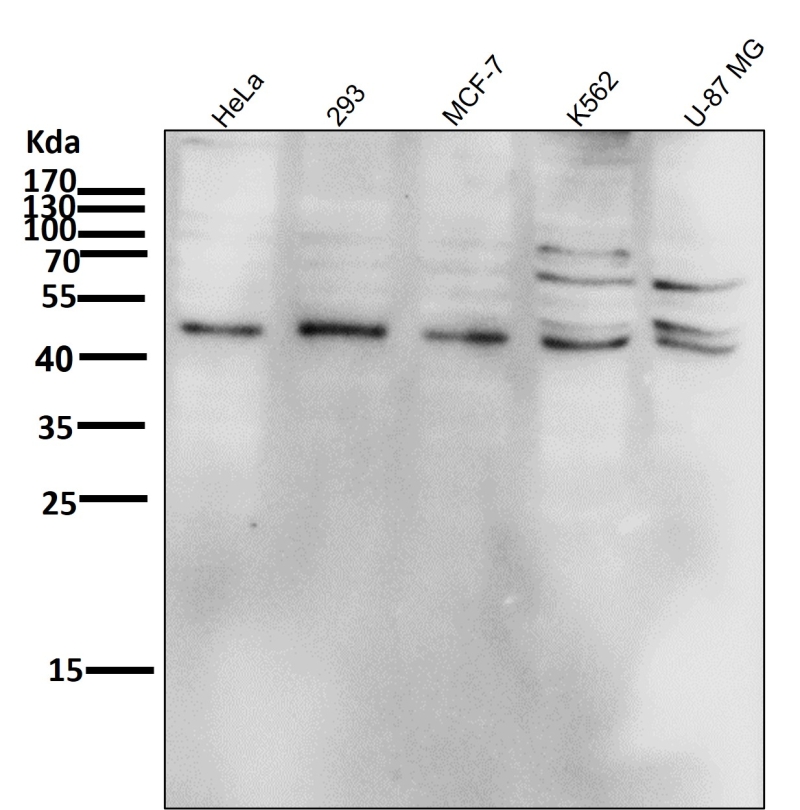
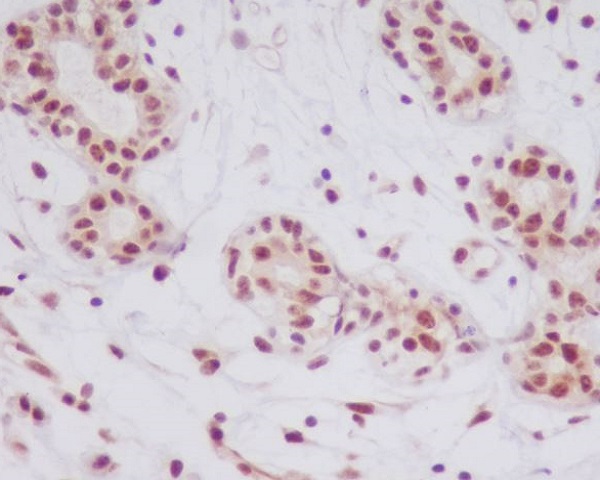
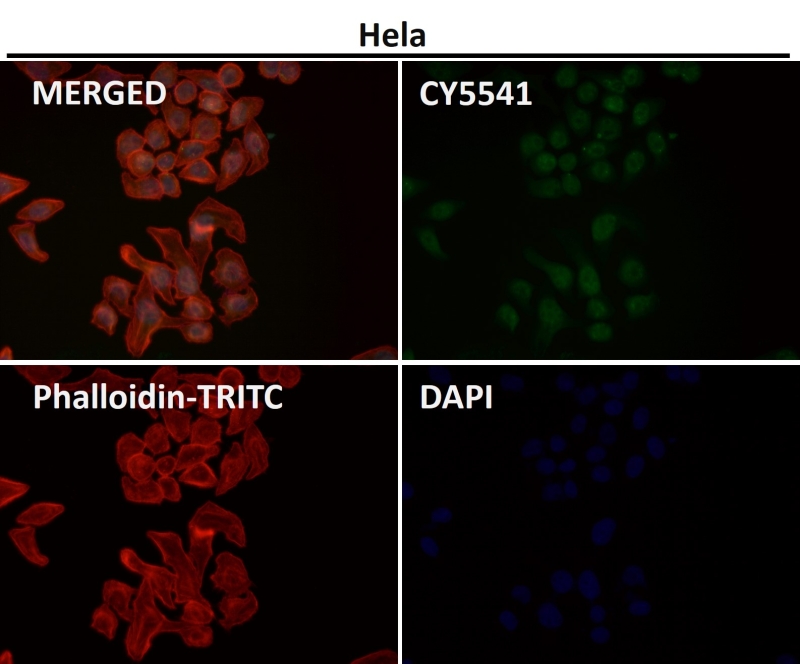
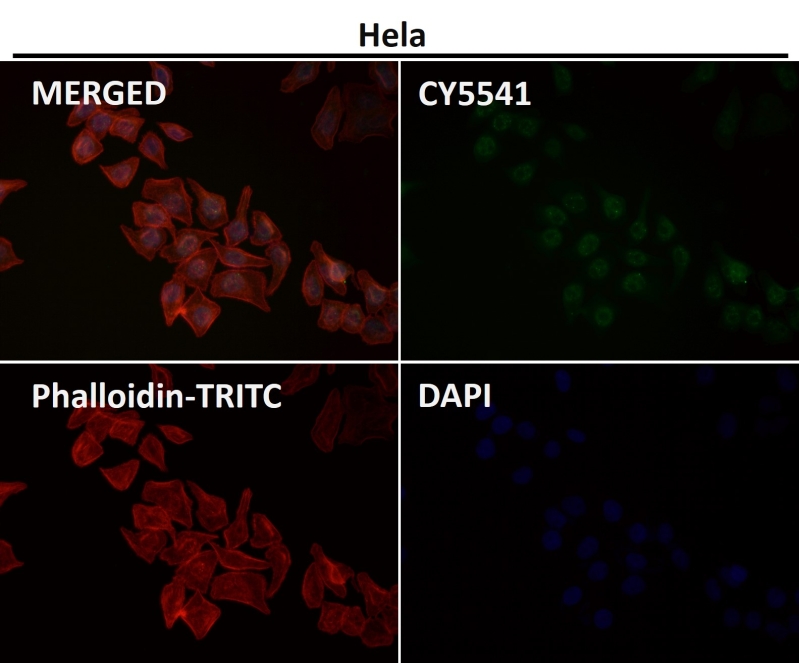
| WB | 咨询技术 | Human,Mouse,Rat |
| IF | 1/20-1/50 | Human,Mouse,Rat |
| IHC | IHC:1/100-1/200;IHF:1/50-1/200 | Human,Mouse,Rat |
| ICC | 1/50-1/200 | Human,Mouse,Rat |
| FCM | 1/20-1/100 | Human,Mouse,Rat |
| Elisa | 咨询技术 | Human,Mouse,Rat |
| Aliases | JNK 46; JNK 55; MAPK10; MAPK9; MAPK8; SAPK1b ; SAPK1; SAPK; PRKM10; PRKM9; PRKM8;;p-JNK1/2/3 (T183/T183/T221) |
| WB Predicted band size | Calculated MW: 48,53 kDa ; Observed MW: 46,54 kDa |
| Host/Isotype | Rabbit IgG |
| Antibody Type | Primary antibody |
| Storage | Store at 4°C short term. Aliquot and store at -20°C long term. Avoid freeze/thaw cycles. |
| Species Reactivity | Human,Mouse,Rat |
| Immunogen | A synthesized peptide derived from human JNK1 around the phosphorylation site of T183 |
| Formulation | Purified antibody in PBS with 0.05% sodium azide,0.05% BSA and 50% glycerol. |
+ +
以下是关于Phospho-JNK1/2/3(T183+T183+T221)抗体的3篇参考文献示例(内容为模拟,需根据实际文献调整):
---
1. **文献名称**:*"Differential Activation of JNK Isoforms in Response to Oxidative Stress"*
**作者**:Smith A, et al.
**摘要**:本研究利用Phospho-JNK1/2/3(T183+T183+T221)特异性抗体,验证了JNK1/2/3在H₂O₂诱导的氧化应激中的差异激活模式,发现JNK3在神经元中的磷酸化水平显著高于其他亚型。
2. **文献名称**:*"Role of JNK Phosphorylation in TNF-α-Induced Apoptosis"*
**作者**:Chen L, et al.
**摘要**:通过Western blot分析,使用T183/T221磷酸化抗体证实JNK1/2/3在TNF-α刺激下的激活,并揭示其通过调控Bcl-2家族蛋白促进线粒体依赖性凋亡通路。
3. **文献名称**:*"JNK3-Specific Phosphorylation at T221 Modulates Neurodegeneration in Parkinson’s Models"*
**作者**:Kimura H, et al.
**摘要**:聚焦JNK3的T221位点磷酸化,结合特异性抗体发现其在MPTP诱导的帕金森病模型中异常激活,提示该位点可能成为神经退行性疾病的治疗靶点。
---
**注意**:以上为模拟参考文献,实际引用需根据具体实验背景调整。建议通过PubMed或Web of Science以关键词“Phospho-JNK1/2/3 antibody”或“JNK phosphorylation T183/T221”检索最新文献,并参考抗体供应商(如CST、Abcam)官网提供的产品引用文献列表。
The Phospho-JNK1/2/3 (Thr183+Thr183+Thr221) antibody detects JNK isoforms (JNK1. JNK2. JNK3) when phosphorylated at specific activation loop residues: Thr183 in JNK1/JNK2 and Thr221 in JNK3. These phosphorylation events, along with Tyr185 (JNK1/JNK2) or Tyr223 (JNK3), are critical for JNK activation, a process mediated by upstream kinases MKK4 and MKK7 in response to stress signals (e.g., UV radiation, cytokines, oxidative stress). Activated JNKs translocate to the nucleus, phosphorylate transcription factors like c-Jun and ATF2. and regulate apoptosis, inflammation, proliferation, and differentiation.
This antibody is widely used in research to study JNK signaling dynamics in diseases such as cancer, neurodegeneration, and immune disorders. By targeting the phosphorylated forms, it helps assess JNK activation status in models of cellular stress, drug responses, or genetic manipulations. Validation often includes Western blotting, immunohistochemistry, or immunofluorescence in cell lines or tissues with known JNK activation (e.g., UV-treated samples as positive controls). Specificity is ensured by comparing phosphorylated vs. non-phosphorylated JNK levels. Researchers rely on this tool to dissect MAPK pathway mechanisms and evaluate therapeutic targets influencing JNK activity.
×